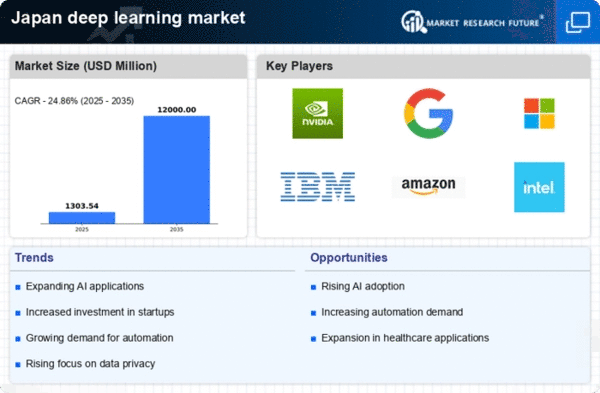Growing Data Availability
The availability of vast amounts of data is a crucial driver for the deep learning market in Japan. As organizations collect and store more data, the need for sophisticated analytical tools becomes apparent. Deep learning algorithms thrive on large datasets, enabling businesses to extract valuable insights and make data-driven decisions. In Japan, the data generation rate is projected to increase by 30% annually, providing a fertile ground for deep learning applications. This influx of data not only enhances model training but also improves the accuracy and reliability of predictions. Consequently, the deep learning market is likely to expand as companies leverage data to gain competitive advantages.
Rising Demand for Automation
The deep learning market in Japan experiences a notable surge in demand for automation across various sectors. Industries such as manufacturing, finance, and retail are increasingly adopting deep learning technologies to enhance operational efficiency and reduce costs. For instance, the integration of deep learning algorithms in robotics has led to improved production lines, resulting in a projected growth rate of 25% in automation-related applications by 2026. This trend indicates a shift towards smart factories and automated systems, which are expected to drive the deep learning market significantly. Furthermore, as companies seek to optimize their processes, the reliance on deep learning solutions is likely to expand, thereby reinforcing the industry's growth trajectory.
Increased Focus on Cybersecurity
As cyber threats become more sophisticated, the deep learning market in Japan is witnessing an increased focus on cybersecurity solutions. Organizations are turning to deep learning technologies to enhance their security measures, utilizing machine learning algorithms to detect anomalies and prevent breaches. The cybersecurity market in Japan is expected to grow to $10 billion by 2025, with deep learning playing a significant role in this expansion. By employing advanced threat detection systems powered by deep learning, companies can proactively address vulnerabilities and safeguard sensitive information. This heightened emphasis on cybersecurity is likely to propel the deep learning market forward, as businesses prioritize the protection of their digital assets.
Government Support for AI Initiatives
The Japanese government plays a pivotal role in fostering the deep learning market through various initiatives and funding programs. By investing in research and development, the government aims to position Japan as a leader in AI technologies. Recent policies have allocated over ¥200 billion to support AI research, which includes deep learning applications. This financial backing not only encourages innovation but also attracts private sector investments, creating a conducive environment for startups and established companies alike. As government support continues, the deep learning market is expected to flourish, with increased collaboration between academia and industry, ultimately leading to groundbreaking advancements.
Advancements in Natural Language Processing
Natural Language Processing (NLP) is a critical area within the deep learning market that is witnessing rapid advancements in Japan. With the increasing need for effective communication between humans and machines, companies are investing heavily in NLP technologies. The market for NLP in Japan is anticipated to reach approximately $1.5 billion by 2027, reflecting a compound annual growth rate (CAGR) of around 20%. This growth is driven by applications in customer service, sentiment analysis, and language translation, which are becoming essential for businesses aiming to enhance user experience. As NLP capabilities improve, the deep learning market is likely to benefit from broader adoption across various sectors, including e-commerce and telecommunications.
















